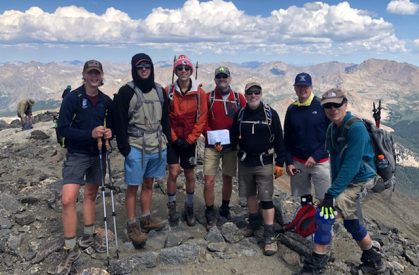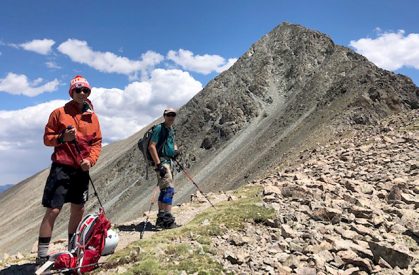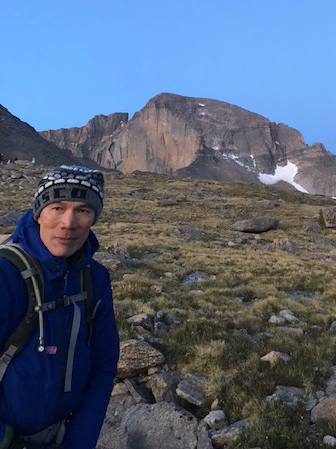By Dr. Paul Chan
Dr. Paul Chan, a Harvard-trained cardiologist, knows something about the struggle of poverty. Born in Hong Kong, Chan emigrated to the U.S. as a young child. The future doctor grew up in the tenement projects of the New York City’s Lower East Side, and his personal experiences formed in him a life-long calling to serve others. He actively works to alleviate hunger and poverty in resource-poor nations. This week, Chan, an avid hiker and outdoorsman, scales six or seven peaks in Colorado, each mountain measuring more than 14,000 feet in elevation. He hikes to bring attention to catastrophic hunger in Guatemala, and he makes the ascent with his 16 year-old son Jesse who was inspired to tackle the mountains after a trip to Guatemala with his father.
July 21, 2020
I first arrived in Chimaltenango, Guatemala, after my senior year at Harvard and after a year working at the Washington DC-based Bread for the World. My role there that year as a volunteer intern was to advocate for changes to US foreign aid to Somalia, Sudan and Ethiopia, and to generate support for legislation to ensure that US foreign aid would not be used as a political weapon. It was the summer of 1990, and Guatemala was still in the throes of their civil war. I spent the summer doing art therapy with children in war-torn villages in Chimaltenango, Huehuetenango, Quiche, and Chiapas Mexico where many refugees from the war had fled.

It became quickly apparent that hunger and poverty were the most visible mountains against which indigenous Maya had to confront daily. These were large barriers to health and a dignified life. In normal times, it was hard to ensure that all children and adults had enough to eat. During the Civil War, poverty and hunger in many people were magnified. Marasmus (a medical term for severe malnutrition due to devastatingly low calorie consumption) and Kwashiorkor (severe malnutrition of not having any or enough protein in one’s diet) were pervasive.
Fast forward exactly three decades, and Guatemalans now are confronted by a new war against an invisible enemy that ravages the poor and vulnerable with little mercy. We have seen this in the US in the deep South, in our inner cities, and in our service sector. We are seeing it in the villages throughout Guatemala. Non-government organizations focused on potable water, latrines, sanitation, and income-generating projects are now confronted with vast losses of the gains they have achieved over the last two decades in Guatemala. Child Aid, which has focused on empowering teachers with the tools to provide more effective learning techniques, is also confronted with a new mission objective — ensuring the educational gains they have inspired over the past years are not lost simply because people in their communities are starving, literally.

I am walking on behalf of the Guatemalans I have come and grown to know and love over the past three decades through over three dozen trips. This week, I will be hiking six to seven peaks in Colorado, all at above 14,000 feet in elevation, for a total elevation gain of over 25,000 feet in altitude gain. Each of these hikes will be dedicated to mountains against which the Guatemalan people struggle. On Monday and Tuesday earlier this week, I hiked Mount Lindsey and then Mount Yale. Mt. Lindsey was terrifying, requiring rock climbing over with sheer drop-offs of several hundred feet on both sides with little room for error. I am joined by my 16 year-old son, Jesse, whom I took down to Guatemala this past January to share my love of the country and also by three food-industry CEOs or leaders.
We stand committed to what Child Aid is doing — ensuring that the most vulnerable families in the communities they have worked in have sufficient food security to make it through the next few months. I encourage you to support their valiant efforts. Over the next week, we will hike at least four more 14,000 peaks focused on four other mountains against which the Guatemalan Maya struggle — landlessness, racism, corrupt government, and Covid-19.
Learn how you can join Child Aid’s Operation White Flag Hunger Relief.
August 1, 2020
Longing for Justice
We did our last 14,000+ peak on Saturday, in celebrating the work of Child Aid and their efforts to provide relief to food insecurity for the Guatemalan indigenous populations whom they serve.

Our hike was Longs Peak, one of the most spectacular 14er (14,000+ peak) in Colorado, and it did not disappoint. The trek was 17 miles round-trip, but what made this hike hard were the last 1.5 miles up and 1.5 miles down along treacherous terrain requiring total attentiveness, care, skill, and perseverance. At times, the incline grade was at 60-70 degrees up a rock slab with no easy hand or foot holds. It is no accident that Longs Peak is the Colorado 14er with the most fatalities, and most of them occur on the return trip back when one is descending in steep and sometimes wet terrain.
Longs Peak is a slog. It is beautiful, but harsh in its elements. We started out for the trailhead at 1:40 AM and arrived at the trailhead at 2:20 AM. At times, the wind was 30-40 miles an hour yesterday, and our hands were cold throughout the entire first 5 hours despite gloves. But Longs Peak is an apt comtemplation of the Guatemalan indigenous people’s journey over the past 70 years. Since the US intervention to overthrow the democratically elected left-leaning Arbenz government, the oppression of the Guatemalan Mayan peoples has been horrific and suffocating.
Even 25 years after the end of the civil war which claimed the lives of nearly 300,000 Guatemalan Mayan people, income disparity in Guatemala remains one of the worst in the Western Hemisphere. For decades, the Guatemalan people have longed for economic justice to ensure a fairer chance for a dignified life. The Guatemalan people have longed for social and racial justice to overcome the barriers of being a darker, indgienous population. The Guatemalan people have longed for political justice to eradicate corruption from political leaders and allow for true democracy to emerge. And the Guatemalan people have longed for a better future for themselves, their children, and their communities. To be fair, some improvements have occurred. Potable water is available in limited communities, but not all. Nutrition has improved marignallty, though childhood malnutrition rates in Guatemala remain the highest of countries in the Western Hemisphere, including Haiti. And there are the semblance of elections. But there remains a long road ahead to equity, equality and justice.
The Covid-19 pandemic is leaving many of the advancements of the past decades in the dust. Development programs and empowerment projects are on hold because communities are hungry for basic necessities, including food. People are afraid. Organizations like Child Aid are stepping in to help fill the void, providing basic food items as a stop gap measure until a more sustainable strategy in resouce-poor countries can materialize against Covid-19. More now than ever, we need supporters to double down on their commitment for the Guatemalan people. We need people to become the voice for the voiceless as the cries of hunger among the Guatemalan Maya are being drowned out by the misery, hunger, and poverty of others (including those in the US) also suffering from the pandemic. We ask that you support the efforts of Child Aid so that their years of engagement in rural Guatemala are not erased by an infection that is not neutral, but unequally targets the poor who have little recourse when asked to practice social distancing and practice good hygiene.
See photos and videos from Operation White Flag Hunger Relief.
As Jesse and I hiked Longs Peak yesterday, I could not but think about how long the Guatemalan people have longed for economic, social, racial and political justice in their lives. And the mere thought of their persistence as we hiked was inspiration enough to continue to the top to celebrate their cause!